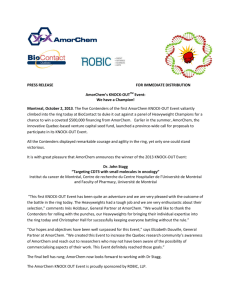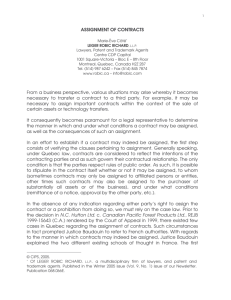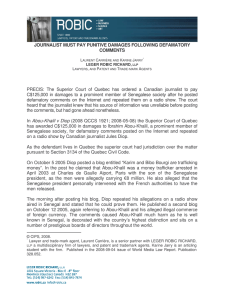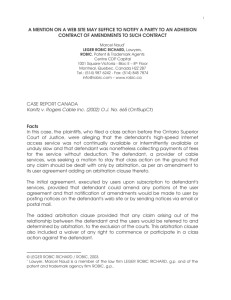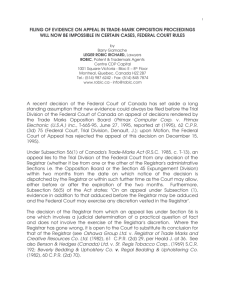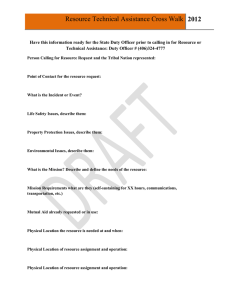REGISTERED USERS ON THE WAY OUT In Canada, a
advertisement
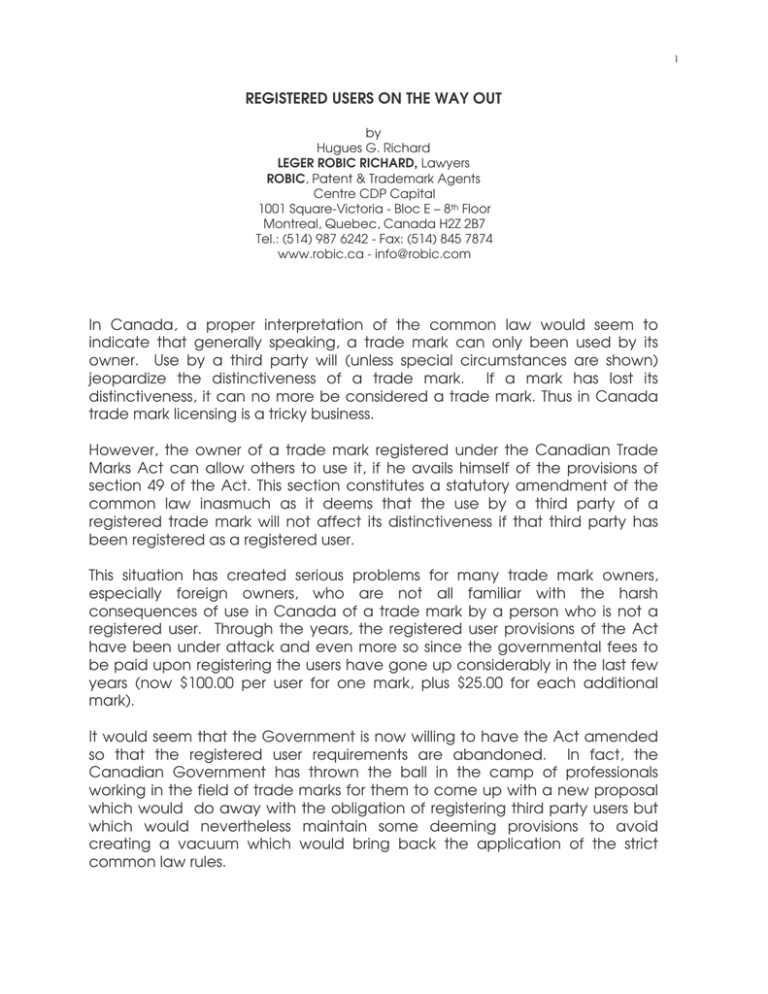
REGISTERED USERS ON THE WAY OUT by Hugues G. Richard LEGER ROBIC RICHARD, Lawyers ROBIC, Patent & Trademark Agents Centre CDP Capital 1001 Square-Victoria - Bloc E – 8th Floor Montreal, Quebec, Canada H2Z 2B7 Tel.: (514) 987 6242 - Fax: (514) 845 7874 www.robic.ca - info@robic.com In Canada, a proper interpretation of the common law would seem to indicate that generally speaking, a trade mark can only been used by its owner. Use by a third party will (unless special circumstances are shown) jeopardize the distinctiveness of a trade mark. If a mark has lost its distinctiveness, it can no more be considered a trade mark. Thus in Canada trade mark licensing is a tricky business. However, the owner of a trade mark registered under the Canadian Trade Marks Act can allow others to use it, if he avails himself of the provisions of section 49 of the Act. This section constitutes a statutory amendment of the common law inasmuch as it deems that the use by a third party of a registered trade mark will not affect its distinctiveness if that third party has been registered as a registered user. This situation has created serious problems for many trade mark owners, especially foreign owners, who are not all familiar with the harsh consequences of use in Canada of a trade mark by a person who is not a registered user. Through the years, the registered user provisions of the Act have been under attack and even more so since the governmental fees to be paid upon registering the users have gone up considerably in the last few years (now $100.00 per user for one mark, plus $25.00 for each additional mark). It would seem that the Government is now willing to have the Act amended so that the registered user requirements are abandoned. In fact, the Canadian Government has thrown the ball in the camp of professionals working in the field of trade marks for them to come up with a new proposal which would do away with the obligation of registering third party users but which would nevertheless maintain some deeming provisions to avoid creating a vacuum which would bring back the application of the strict common law rules. The Patent and Trademark Institute of Canada has been playing a leadership role in trying to arrive at a consensus in the trade mark profession. This consensus is close at hand. The majority view would be that section 49 be abolished and replaced by provisions somewhat similar to those known in the United States of America. In other words, inasmuch as the trade mark owner would control directly or indirectly the character or quality of the wares or services to which the license applies, then the use, advertisement or display of the trade mark by the licensee under the owner's control would be deemed always to have had the same effect as use, advertisement or display by the owner. Those representing the minority view would wish to see a voluntary recordal system which would give rise to a presumption of use by the owner of the trade mark when the user is actually a registered third party. Those who are against this latter proposal think that it will create similar problems as does the current situation, since most trade mark owners will feel compelled to register their licensees. The Canadian Government is committed to abolish section 49; it is to be hoped that the Canadian trade mark profession will not miss this opportunity. Published at (1988), 2 W.I.P.R. 220-221 under the title Trade Mark Bar Seeks to Eliminate Act's Registered User Provisions. © LEGER ROBIC RICHARD / ROBIC, 1988. ROBIC, un groupe d'avocats et d'agents de brevets et de marques de commerce voué depuis 1892 à la protection et à la valorisation de la propriété intellectuelle dans tous les domaines: brevets, dessins industriels et modèles utilitaires; marques de commerce, marques de certification et appellations d'origine; droits d'auteur, propriété littéraire et artistique, droits voisins et de l'artiste interprète; informatique, logiciels et circuits intégrés; biotechnologies, pharmaceutiques et obtentions végétales; secrets de commerce, know-how et concurrence; licences, franchises et transferts de technologies; commerce électronique, distribution et droit des affaires; marquage, publicité et étiquetage; poursuite, litige et arbitrage; vérification diligente et audit; et ce, tant au Canada qu'ailleurs dans le monde. La maîtrise des intangibles. ROBIC, a group of lawyers and of patent and trademark agents dedicated since 1892 to the protection and the valorization of all fields of intellectual property: patents, industrial designs and utility patents; trademarks, certification marks and indications of origin; copyright and entertainment law, artists and performers, neighbouring rights; computer, software and integrated circuits; biotechnologies, pharmaceuticals and plant breeders; trade secrets, know-how, competition and anti-trust; licensing, franchising and technology transfers; ecommerce, distribution and business law; marketing, publicity and labelling; prosecution litigation and arbitration; due diligence; in Canada and throughout the world. Ideas live here. COPYRIGHTER IDEAS LIVE HERE IL A TOUT DE MÊME FALLU L'INVENTER! LA MAÎTRISE DES INTANGIBLES LEGER ROBIC RICHARD NOS FENÊTRES GRANDES OUVERTES SUR LE MONDE DES AFFAIRES PATENTER R ROBIC ROBIC + DROIT +AFFAIRES +SCIENCES +ARTS ROBIC ++++ ROBIC +LAW +BUSINESS +SCIENCE +ART THE TRADEMARKER GROUP TRADEMARKER VOS IDÉES À LA PORTÉE DU MONDE , DES AFFAIRES À LA GRANDEUR DE LA PLANÈTE YOUR BUSINESS IS THE WORLD OF IDEAS; OUR BUSINESS BRINGS YOUR IDEAS TO THE WORLD
